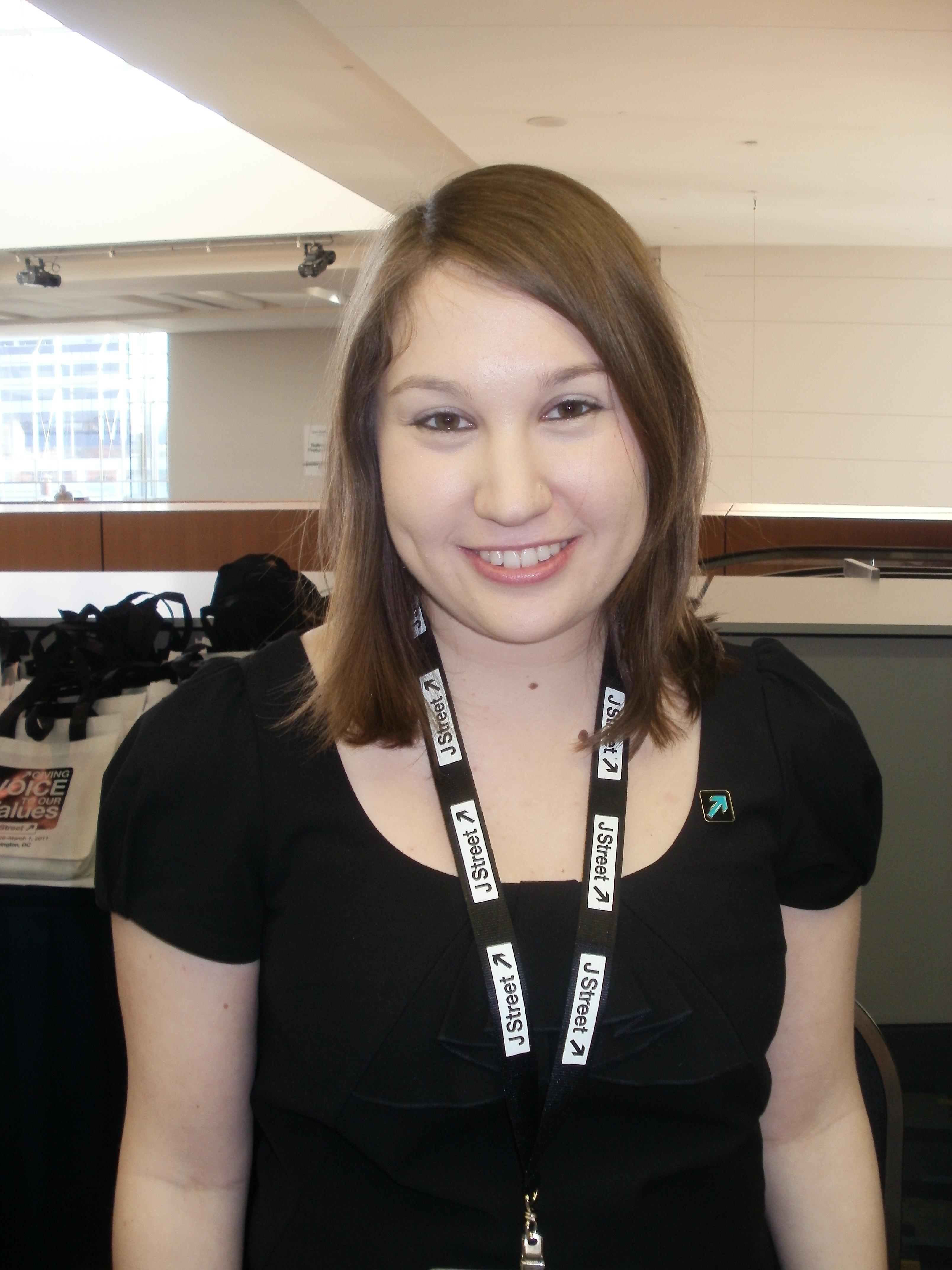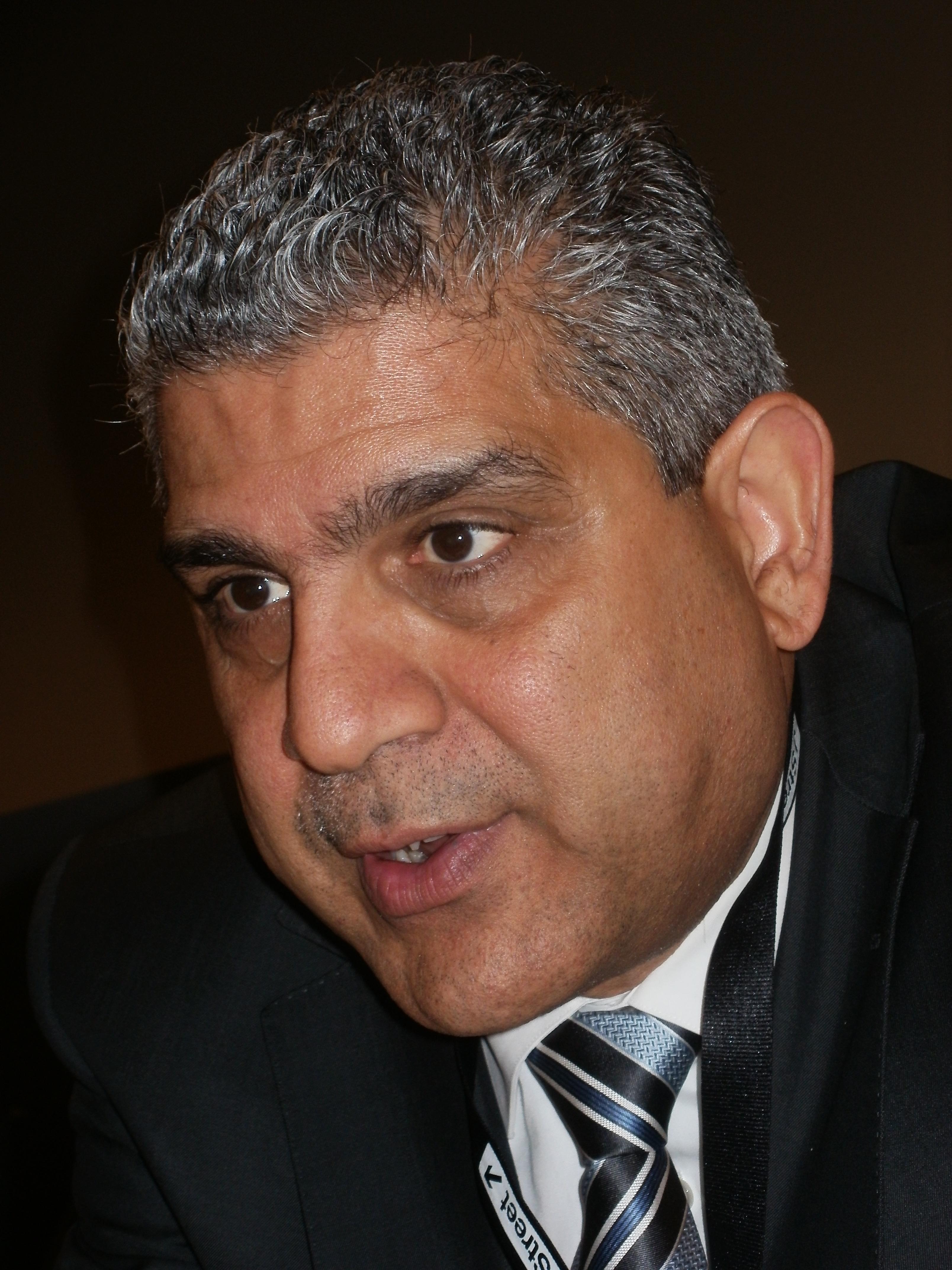![]()

Amy Spitalnick, media spokesperson for J-Street
photo by Rhonda Spivak

Ron Pundak, Director of the Peres Centre for Peace
photo by Rhonda Spivak

PA Ambassador Maen Areikat, Chief Representative of the PLO delegation to the U.S
photo by Rhonda Spivak
|
|
When PA representative was out of ear shot, Arab participants at J Street conference confirmed PA fears being overthrown by its people
Dennis Ross’s speech at J-Street was not what many J-street supporters hoped it would be. It was delivered without much enthusiasm. The American Jewish reporter sitting beside me said, “I’ve heard Dennis Ross speak many times- this is the worst speech I’ve heard him give.” Ross was there to show that J-Street wasn’t being ignored by the Obama administration, but I got the feeling he would have preferred to have been elsewhere.
J Streeters seemed to be taken aback that Ross didn’t speak more about the Israeli-Palestinian issue, and focused mostly on Egypt, (reciting things that everyone already knew and explaining how well Obama had handled the situation). This left the impression that the Obama administration wasn’t quite sure what to do in regards to the peace process, and if anything, was beginning to retreat form the process it first embraced with much eagerness.
Ross said “We will continue to press both sides to engage seriously in negotiations” – but there were really no details. In a session afterward, Marwan Bishara, a senior political analyst at Al Jazeera said “It’s disappointing that you (J-Street) would still host someone like Dennis Ross after 20 years of peace failure,” and he received tremendous applause from the J-Street crowd (showing just how left of centre the J Street crowd is).
In closing his speech, Ross mentioned the upheaval in Egypt and elsewhere in Bahrain etc first in summarizing the Administration’s agenda “We clearly have a full plate of challenges in the Middle East today. But our agenda is clear: help Egypt to conduct a successful, orderly, and credible transition; encourage others in the region to undertake meaningful reform now before they too face destabilizing unrest; continue the push for peace between Israelis, Palestinians…”
Douglas Bloomfield in an article in the Jerusalem Post has written the “administration apparently sees the prospects as so bleak it is reluctant to risk any more political capital on active mediation as a difficult election year approaches, especially when so few in Congress appear inclined to back it.” Bloomfield’s assessment in my view is on the mark.
When Ross spoke of America’s “unshakeable commitment to Israel’s security” he received some applause from J-Streeters but the volume of applause was much louder when he said that “If Israel can view one lesson from the events in Egypt, it is the danger of getting stuck with an unsustainable status quo.”
J-Streeters do not want the status quo: They want a Palestinian state and they want it now-they want a deal to be done by the September-October 2011 when they Palestinians are going to declare a state unilaterally (which the US will have to veto to prevent becoming a reality).
The J-Streeters are not terribly focused on what Israel’s legitimate security requirements would be in an agreement. There were no sessions dicussing whether Israel needs a presence in the Jordan valley (in the very plausible event that hostile forces could attack it from Jordan, particularly if King Abdullah is overthrown and Jordan becomes ruled by its Palestinian majority, and is an outpost for Iran.) There was no focus on whether Israel needs to control airspace over the West Bank (to give it time to respond to an ariel attack without being wiped out). There were no sessions about a Palestinian state being de-militarized and how to accomplish this or if it is really possible. These are all session topics that could have been in the program if there were a more serious interest in Israel’s legitimate security needs.
The main assumption of many of the sessions was that Abbas and the PA are ready for a peace agreement-but it is only Israel that is not. Political economist Bernard Avishai said as much as that after Dennis Ross’s speech.
Avishai called on the had American government to offer a bridging proposal and a blue print of the American position and make it public and then run around the world having the Quartet, Germany’s Merkal, and the UN endorse this so that pressure will build on Israel to accept it. ( he assumes that the Palestinians would accept it, a highly dubious proposition in my view). In other words, more or less, Avishai and other J Streeters such as Ron Pundak of the Peres Centre for Peace (who told me he agrees with Avishai), are pushing, more or less, for an imposed American solution.
But, this is at odds with what the UN envoy Robert Serry said at the conference, which is that the Palestinian Authority fears the upheaval in Arab world will engulf the West Bank, an assessment that I share and have reported on previously. The PA establishment he said is worried that the youth will rise up against it. That is why Prime Minister Salam Fayyad is trying to co-opt Hamas, as Yasser Arafat did, to include it in th e PA.
Serry also reportedly said that President Mahmoud Abbas has retreated to the Yasser Arafat position, minus the violence.( It is also worth remembering that the PLO’s definition of illegal settlments includes the Jewish communities established since 1947, not 1967. This has never changed)
The real possibility of the PA being overthrown was something I heard from several Arabs participants at the J-Street convention. However, they said this only in private conversations after PA Ambassador Maen Areikat, Chief Representative of the PLO delegation to the U.S. had left the room.
At the conference I asked an Arab journalist I met why it was that right after the US vetoed the Palestinian UN resolution calling for a halt to the settlements, the PA had a rally in Ramallah against the US veto that only had 3000 people in it. Afterall, this ought to have been a rally that drew tens of thousands or hundreds of thousands of West Bank Palestinians. The answer was what I expected: “The PA wouldn’t have allowed the rally to have more people as they are afraid of being overthrown- (in other words the rally would in up being directed agaisn the corrupt PA leadership) In fact I suspect that the PA chose their own loyalists to be at the rally, including PA workers who depend on them for their bread and butter.
A Palestinian “insider” spoke with me about the possibility that the winds of change would serve to unseat the PA in the West Bank and/or Hamas in Gaza. ( although I responded that I suspect Hamas would use all means at their disposal to prevent this and out of the two the PA is more vulnerable)
Another Palestinian at the conference told me that “I wouldn’t vote for Abbas”, but said he would support Marwan Barghouti (who is in Israeli jail serving time for his murder convictions) Barghouti he explained was in jail and hadn’t lined his pockets as Abbas and his chronies had.
He said “There is already a facebook page dedicated to ousting Abbas.”
When Ron Pundak, director of the Peres Centre for Peace said in a session at the conference that that “if an election were held today, Abbas would win..we know it,” I wondered if I had heard correctly. I think the opposite is more likely to be true-that if there were an election held today-Abbas would be sent home. In fact, a J-Street delegate questioned Pundak about his assumption.
In short, the J-Street agenda does not appear to be compatible with the P-Street agenda.
Note: There is a worthwhule article written by Alana Goodman in Commentary Magazine entitled Some Questions for Dennis Ross that takes issue with Ross’s appearance at the conference. It begins;
“As Ambassador Dennis Ross prepares to speak at the upcoming J Street conference, he might want to think about addressing a few serious concerns during his speech. While Ross has certainly been a friend to Israel, some of the people he’ll be sharing the spotlight with at the conference have not. Far from it – quite a few of them can’t be characterized as anything other than outright enemies of the Jewish state. And so by lending his profile to the event, Ross is giving credence to the noxious ideas of his fellow conference speakers.
“The Emergency Committee for Israel has outlined some of the troublesome statements made by other conference speakers in a letter it sent to Ross today. These include the claim that Israel is “a full-fledged Apartheid system,” as Ross’s fellow speaker Mustafa Barghouti alleges. Add to that the insistence, by Nadia Bilbassy-Charters, that Hamas shouldn’t be “lumped in” with other terrorist groups. And Edina Lekovic’s designation of Osama bin Laden as a “freedom fighter.” Consider also the allegation, by James Zogby, that the IDF is waging a “Holocaust” against the Palestinian people. And the dangerous theory that Jewish members of the Bush administration were surreptitious agents of Israel, as advanced by Lawrence Wilkerson.












